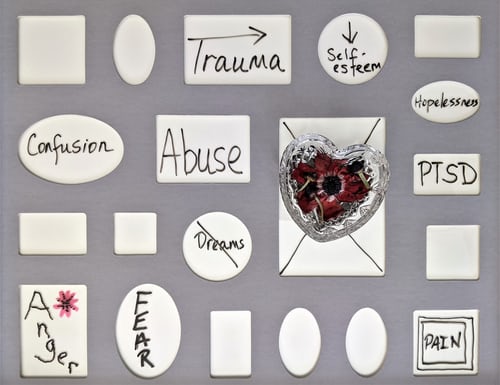What do you think is the most important thing a narcissist steals from you? Admittedly, that is a heck of a question. However, it is a big question that needs to be asked. It can only help your healing if you can drill down to the core of the problem. How are you meant to heal from what you have been through if you do not even see the full effects of what has happened? When you don’t fully understand the consequences of abuse, you end up blaming yourself and saying, “It’s just me,” when you are struggling with previously unacknowledged trauma.
Once you can see trauma for what it is, you can show more self-compassion – and work on your healing in a deeper, more effective way.
Read some of my essays and you will see how I keep complaining how The Narc refused to return my pre-marital property (jewelry, hundreds, and hundreds of photos and videos and old film, signed memorabilia, etc.). She lied to our sons, family, friends, neighbors, clergy. She ignored court orders. She quietly laughed at the judge.
But after all this time, I have come to understand that doesn’t matter. At the end of the day, it can’t. It just cannot matter when I have not corrected the foremost object she took.
So, I am going to look at the most important – and often overlooked – thing that a narcissist steals from you and how you reclaim it.
All narcissists are emotional asset-strippers
Any toxic relationship is a kind of emotional asset-stripping operation. Your abuser will rob you of your:
- Time
- Joy
- Faith in humanity
- Material assets
- Reputation
- Friends and family
- Credibility
- Trust
- Certainties
- Self-worth
But, in the end, the biggest thing the narcissist steal from you is your sense of who you are.
Identity theft
Just about every woman – and man – I have ever spoken with about emotional and narcissistic abuse has stated they have:
- Forgotten who they were
- Lost their voice
- Lost sight of themselves
- Lost the happy and/or confident person that they once were
Toxic people specialize in identity theft.
You don’t end up feeling like a hollow, broken shell of the person you once were by chance.
It is no accident that as a survivor, when I am asked what I enjoy doing, I look blankly and reply, “I don’t even know anymore.”
Narcissists rob you of your sense of self because that serves their best interest. There really is only room for one person in the relationship. That person was never going to be you. You are only there as a mirror in which they can see their own reflection. Can we repeat this? That person was never going to be you. You are only there as a mirror in which they can see their own reflection.
Four plus years away from her and I am finally beginning to see the light. But to be perfectly frank (or Joe or Bill), she is still kicking the shit out of me.
Healing requires you to reclaim your missing self
So, when it comes to healing, the logical place to start is by reclaiming that missing self.
Unfortunately, the double-bind is this: when you have come to feel so unworthy, how do you justify focusing on yourself, first and foremost?
Most of us don’t.
Instead, we take that lesson learned from a narcissist. We are unimportant and we continue to run with it.
We leave our own healing on the back burner until such time as our circumstances, our children and everything else finally cut us some slack. Unfortunately, that tends not to happen – because life just doesn’t seem to work that way.

John Lennon famously said, “Life is what happens when you are busy making other plans.”
On one level, I wouldn’t disagree with him. However, on another, an abusive relationship could teach us that we need to make a very clear distinction between life and people.
An abusive relationship happens when…
Sooner or later, you come to realize that an abusive relationship happens to you when you were busy making very different plans.
Once an abusive relationship has happened to you, you start to see you can never, ever, afford to let people happen to you as they please.
You can only afford to let them happen to you insofar as that works for you – and with your consent. In other words, you really must take charge of who is, and is not, allowed access to your head and your heart-space.
To do that, you must break the old patterns of thought and behavior. You must take yourself beyond the old patterns of believing that:
- a) you really don’t matter and
b) it is always your job to go the extra mile, or several, for other people – irrespective of their behavior towards you.
An instructive dream
I had this dream a while back. In it, I found a note my wife had written and left, in the kitchen intentionally by accident. The message that it conveyed was, that I was an inferior sort of person – standard narcissistic stuff.
In this dream, without a moment’s hesitation I did something I would rarely do. I stormed out on her. She followed me, yelling, screaming, and begged me to come back. I told her precisely what I thought of her, told her that I was divorcing her, and kept on walking.
This dream was too instructive to disregard. I had been processing new ways of feeling about myself and my soon-to-be ex and I had arrived at a very different way of feeling about her.
Until that point, my (sleeping) dreams/nightmares had all been about how I needed her in my life, despite her abusive behavior.
My subconscious mind was just telling me that something had shifted inside of me, and she no longer had access to my head and heart-space.
I had spent 19+ years with this horrible, soul-free woman.
I regretted those years. But it gets complicated. I created two of the most beautiful human beings walking the earth. Oh, The Narc made sure they despise every fiber of my being and they believe their mother and her family when they tell them how horrific I am. And I ask myself every day if this will be the day they break away and ask to talk to me. So, I had made a mental shift, too. I had realized that, while I cannot have those years back, I could use the rest of my life to more than make up for my joy deficit.
I am thinking how that might be a good project to work on.
Making a clear break with a wretched past
I was making a clear break between my miserable past and my present and future. I have no doubt that my present and future will be brighter because I am committed to making them much brighter.
Besides, removing a narcissist from your life is not unlike removing a piece of grit (no typo) from your eye – just the absence of the pain is enough to make you feel much, much better.
What we must understand is healing does require you to focus on yourself first.
You cannot heal what you do not focus on.
I have been learning this the hard way. You cannot root out old patterns of feeling and behavior that you do not address.
Break the old patterns. It can be, no, will be the hardest thing you have ever done. As hard or harder than drug addiction, alcohol addiction, cigarette addiction.
Even when you know, deep down, that you weren’t to blame, believing this is often another story.
 Wondering what you could have done differently to prevent abuse or help your loved one (and I use this term loosely) address their issues can add to your emotional turmoil.
Wondering what you could have done differently to prevent abuse or help your loved one (and I use this term loosely) address their issues can add to your emotional turmoil.
Toxic relationships also share some similarities with addiction. The relationship is intoxicating. There is intermittent reinforcement, and there is a great deal of shame and guilt about the relationship.
These factors can come into play as you try to recover.
You know the relationship wasn’t healthy. You’re aware they mistreated you. But you still can’t shake your memories of how you felt in the beginning and the good times you had.
These memories might lead you to crave their company and feel like you’d do anything to earn their love and approval again.
Abuse is deeply traumatizing, and the healing process can take some time. Allow me to explain why.
You might have a hard time setting aside rationalizations and potential excuses for the other person’s behavior.
In fact, you may feel perfectly willing to take blame on yourself, if it means you don’t have to admit someone you love intentionally tried to hurt you.
This is normal and completely understandable.
Denial can protect you. Strong romantic or familial love overshadows reality for many people.
It’s also tough to accept that some people just don’t seem to care when they hurt others.
But denying what happened prevents you from addressing it and healing from it. It can also set you up to experience more pain in the future.
Set your boundaries and state them clearly
Therapists and abuse recovery specialists often recommend cutting off all contact with your ex-partner after ending the relationship, whenever possible.
Going no contact isn’t just a boundary for them. It’s also a boundary for you, one you might find extremely difficult at first.
It’s common to feel tempted to reach out or respond to phone calls and messages, especially if they apologize sincerely and promise to change.
Blocking their number, email address, and social media accounts can help you avoid giving in to this temptation.
Keep in mind they may still try to contact you through other routes, so it can help to have a plan for how you’ll deal with this.
But I get it, going no contact isn’t possible in every situation. Maybe you have children with them, or they’re a family member you’ll see occasionally at gatherings.
If so, think about what you want and need: “I deserve to be treated with respect.”
Then turn that into a boundary: “I am willing to have a conversation with you, but if you shout, swear, or call me names, I’ll leave immediately.”
The trauma of a toxic relationship can also leave you with symptoms of post-traumatic stress disorder (PTSD).
Toxic people can cause a lot of pain. But they also have a knack for getting you to believe in their reality.
So, while you may have sustained some deep emotional wounds, you might still question your own actions.
Your love for them can, for example, convince you it was your fault they manipulated you and mistreated you.
Breaking off a toxic family relationship can also trigger feelings of guilt or disloyalty.
These are normal emotional experiences. Working through them alone isn’t always easy, especially when you feel confused by manipulation tactics.
Reclaim your identity
People with narcissistic traits often expect others to behave in certain ways. They harshly belittle or criticize people for failing to meet these standards. Here’s what it can look like:

Your ex said your hair looked “stupid and ugly,” so you changed it.
Your parent regularly told you how “foolish” you were for “wasting time” on music, so you gave up playing the piano.
They might try to control your time and keep you from seeing friends or participating in activities by yourself.
If you’ve changed your looks and style or lost things you used to value because of this manipulation, you might feel as if you no longer know yourself very well.
You’re still healing, after all. Self-exploration and rebuilding your relationship with yourself can make you vulnerable.
Remember, no one deserves abuse, and their behavior is not your fault.
Instead of blaming yourself for falling for their manipulation or judging yourself letting them mistreat you for so long, offer yourself forgiveness instead.
Remember you cannot change the past and you can’t change their behavior or actions. You only have power over yourself.
So, back to our question. What is the most important thing a narcissist steals from you? The most important thing that a narcissist steals from you is your sense of yourself. When you break old patterns of letting other people fill your head and heart-space with their negative feelings about you, you soon start to reconnect with your authentic self that lies beneath all that programming. When will you liberate your heart and headspace? (I ask myself every day).

